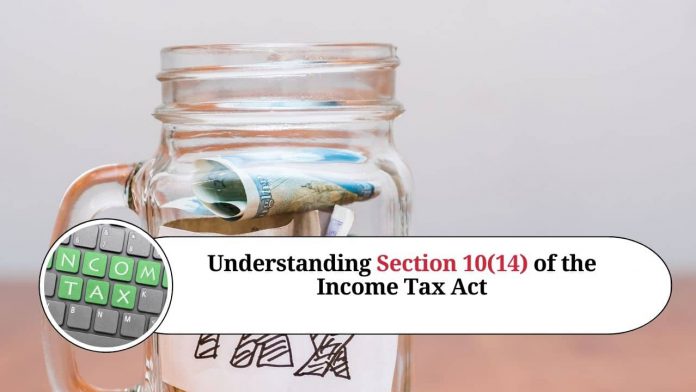The Indian Income Tax Act is a complex set of rules and regulations governing taxation in India. Among its many sections is Section 10(14), which deals with various allowances and benefits that are exempt from tax. This article aims to explain the provisions of Section 10(14) and its implications for taxpayers.
Overview of Section 10(14):
Section 10(14) of the Income Tax Act lists various allowances and benefits that are exempt from tax. These exemptions are provided to encourage certain activities or compensate for certain expenses incurred by the taxpayer. The section also lays down the conditions for claiming these exemptions.
Allowances exempt under Section 10(14):
Section 10(14) provides exemptions for various allowances and benefits, including:
- Daily Allowance: Any allowance granted to meet the ordinary daily expenses incurred by an employee on account of his employment is exempt from tax.
- House Rent Allowance: House Rent Allowance (HRA) is exempt from tax to the extent of the lowest of the following amounts:
- Actual HRA received from the employer
- Rent paid minus 10% of basic salary
- 50% of the basic salary if residing in metro cities or 40% of the basic salary if residing in non-metro cities
- Conveyance Allowance: Any allowance granted to meet the expenses incurred by an employee in commuting between his place of residence and place of work is exempt from tax to the extent of Rs. 1,800 per month.
- Leave Travel Allowance: Leave Travel Allowance (LTA) is exempt from tax twice in a block of four years subject to certain conditions.
- Medical Allowance: Any allowance granted to meet the medical expenses of an employee or his family is exempt from tax to the extent of Rs. 15,000 per year.
Conditions for claiming exemption:
Section 10(14) lays down certain conditions for claiming exemptions under this section. These conditions include:
- The allowance should be granted to the employee by his employer.
- The allowance should be utilized by the employee for the purpose for which it is granted.
- The allowance should be a reasonable amount.
- The employee should produce proof of expenses incurred for claiming exemption.
Recent Changes in Section 10(14):
In the Union Budget 2021, the government introduced a new tax regime that allows taxpayers to choose between the old tax regime and the new tax regime. Under the new tax regime, taxpayers can no longer claim exemptions under Section 10(14). However, taxpayers who opt for the old tax regime can continue to claim exemptions under this section.
Conclusion:
Section 10(14) of the Income Tax Act provides exemptions for various allowances and benefits. Taxpayers can claim these exemptions subject to certain conditions. Taxpayers need to understand the provisions of this section to ensure that they do not inadvertently violate the provisions of the Income Tax Act. With the recent changes introduced in the Union Budget 2021, taxpayers need to evaluate the pros and cons of the old and new tax regimes before making a decision.
Other Related Blogs: Section 144B Income Tax Act
Frequently Asked Questions
Q.1 What is Section 10(14) of the Income Tax Act? Section 10(14) of the Income Tax Act provides exemptions for various allowances and benefits that are granted by the employer to the employee.
Q.2 What are the allowances exempt under Section 10(14)? Some of the allowances that are exempt under Section 10(14) include house rent allowance (HRA), daily allowance, conveyance allowance, leave travel allowance (LTA), and medical allowance.
Q.3 What are the conditions for claiming exemption under Section 10(14)? The allowance should be granted by the employer, it should be utilized for the purpose for which it is granted, it should be of a reasonable amount, and the employee should produce proof of expenses incurred.
Q.4 Is there any limit on the amount of exemption that can be claimed under Section 10(14)? Yes, there are limits on the amount of exemption that can be claimed for different allowances. For example, the exemption for HRA is limited to the lowest of actual HRA received rent paid minus 10% of basic salary, 50% of basic salary for metro cities or 40% of basic salary for non-metro cities.
Q.5 Can a taxpayer claim exemption under Section 10(14) in the new tax regime introduce in the Union Budget 2021?
- No, taxpayers cannot claim an exemption under Section 10(14) in the new tax regime. However, taxpayers who opt for the old tax regime can continue to claim exemptions under this section.
- Q.6How important is it to understand Section 10(14) of the Income Tax Act?
- Taxpayers need to understand the provisions of Section 10(14) of the Income Tax Act to ensure that they comply with the tax laws and do not inadvertently violate any provisions. This can help them avoid any penalties or legal issues in the future.




















